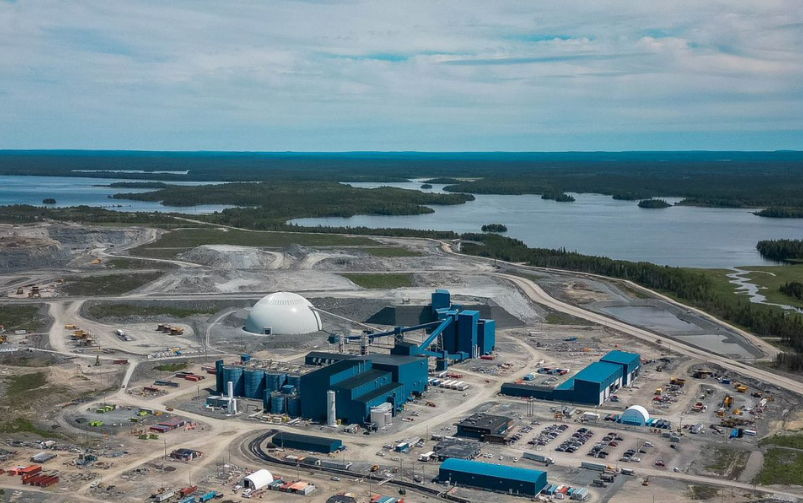Trevor Walker, president and CEO of Frontier Lithium, at the funding announcement in Thunder Bay, Ontario, on Oct. 7. A portion of the funding will support two projects related to Frontier Lithium’s Pakeagama (PAK) lithium project, which is currently under development. Photo courtesy of Frontier Lithium.
The federal government recently announced a slew of funding to support critical minerals development in northern Ontario. Natural Resources Minister Jonathan Wilkinson was on site in Thunder Bay and Sudbury this week to deliver the news that almost $25 million in funding would be provided for mining projects in the province.
On Oct. 7, Wilkinson shared that the federal government will invest up to $13.8 million in conditionally approved funding to support five mining infrastructure projects in northern Ontario related to critical minerals development.
“These projects, under the Canadian Critical Minerals Strategy’s flagship program, will develop the necessary infrastructure to access and transport our rich critical mineral resources in Northwestern Ontario to market,’’ said Wilkinson in an Oct. 7 press release. “Developments like these help mines get built faster, and they are a key element in seizing the generational opportunity before us.’’
The money is being provided by the Canadian government’s Critical Minerals Infrastructure Fund (CMIF), which launched in October 2023. Over a span of seven years, up to $1.5 billion in funding will be allocated to support transportation infrastructure necessary for the country’s development of clean energy and critical minerals projects.
In this round of funding, Wilkinson announced that up to $6.1 million will be granted to Frontier Lithium Inc. to support two projects. The first project involves preconstruction activities, including environmental studies, for a 56-kilometre, two-lane all-season access road connecting the future Pakeagama (PAK) lithium project, which is located in northwest Ontario, to the province’s highway system. The second project includes engineering, design, and permitting studies for a substation and transmission line that would link PAK to the Wataynikaneyap (Watay) power transmission line.
Frontier Lithium is currently advancing a definitive feasibility study and aims to begin construction with site prep and clearing in 2025 and finalize permitting in 2026. The company’s feasibility study will guide the specifics of building a mine and mill at the same site. According to the company, the PAK project contains North America's highest-grade lithium reserves and is the largest in Ontario by size.
“As we move forward on our path to building the first fully integrated lithium mining-and-processing operation in Ontario, we know our objectives align nicely with that of the Critical Mineral Infrastructure Fund – to address infrastructure gaps, reduce emissions, and advance reconciliation with Indigenous Peoples,” said Trevor Walker, president and chief executive officer (CEO) of Frontier Lithium, in an Oct. 7 press release.
Green Technology Metals will receive up to $5.5 million to enhance 56 kilometres of existing roads and replace three bridges, aiding the development of its Seymour lithium project located near Armstrong, Ontario, and allowing for a bypass of residential areas.
The company is aiming to begin production in 2026, as it currently seeks to secure final permits needed before construction can begin. It is working on a definitive feasibility study to support a final investment decision.
“This road and bridge upgrade project is essential for advancing the mine’s development and will bring significant benefits to the local community, such as improving road safety and reducing traffic through town,” said Cameron Henry, Green Technology Metals’ managing director, in an Oct. 9 press release. “The development of the Seymour project is a priority for Green Technology Metals, as it will play a key role in unlocking the full potential of the Canadian battery supply chain.”
Rock Tech Lithium will be granted up to $1.4 million to update and extend a 10-kilometre access road located north of Nipigon, Ontario, facilitating the transportation of lithium from the company’s Georgia Lake Project mine site, which includes both open pit and underground mining operations.
The company shared that the project could advance to the mine construction phase this year, though the start date is contingent on plans for its lithium refinery coming to Red Rock Bay, Ontario. It has not released a construction or project timeline for the refinery.
"We are honoured to receive this funding to support the development of our Georgia Lake mining project,” said Dirk Harbecke, Rock Tech's CEO, in an Oct. 9 press release. “Unlike many other projects in Ontario, our Georgia Lake project benefits from a highly strategic location with extensive infrastructure already in place."
Up to $771,100 will be granted to Generation Mining to conduct engineering and design work for a five-kilometre site access road, as well as feasibility studies for additional road and rail connections to aid in transporting copper concentrates from the company’s Marathon palladium-copper project to smelters located in Canada and Europe.
So far, the company has completed an updated feasibility study, an environmental assessment and is now focused on securing construction financing.
Jamie Levy, president and CEO of Generation Mining, shared in an Oct. 7 press release that “with all federal approvals for construction having been obtained, and only three outstanding provincial permits expected to be granted by year-end, the work undertaken with this funding could support construction activities in 2025.”
On Oct. 9, Wilkinson also announced $8.4 million in conditionally approved CMIF funding for five other projects located in the Sudbury and Timmins regions of Ontario.
Canada Nickel’s Crawford nickel sulfide project is eligible for $6.8 million, with $2.4 million being used to progress a transmission line linking the project to the Ontario power grid and $4.4 million going towards electrification studies, which are expected to be completed next year.
It stated in an Oct. 9 press release that the studies are expected to lead to mining production that will reduce greenhouse gas emissions by more than 60 per cent compared to diesel-powered operations.
The government will provide Magna Mining with $1.6 million to support preconstruction activities to help power its Shakespeare and Crean Hill mines, which will produce nickel and copper. These efforts will facilitate the supply of clean electricity to the mines and connect them to the Ontario highway system.
An amount of $2.7 million will be provided to Giyak Mishkawzid Shkagmikwe Inc. and Taighwenini Technical Services Corporation to purchase two production mining drills that can be leased out to foster training opportunities for First Nations, promote wealth generation, and encourage participation in the clean economy. The purchase will enable the Indigenous partners to take part in the revitalization of Vale's Stobie mine in Sudbury, a joint project involving Vale, Thiess, United Steel Workers, and local First Nations, aimed at increasing nickel and copper production.




